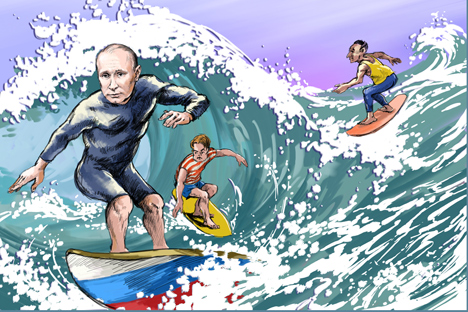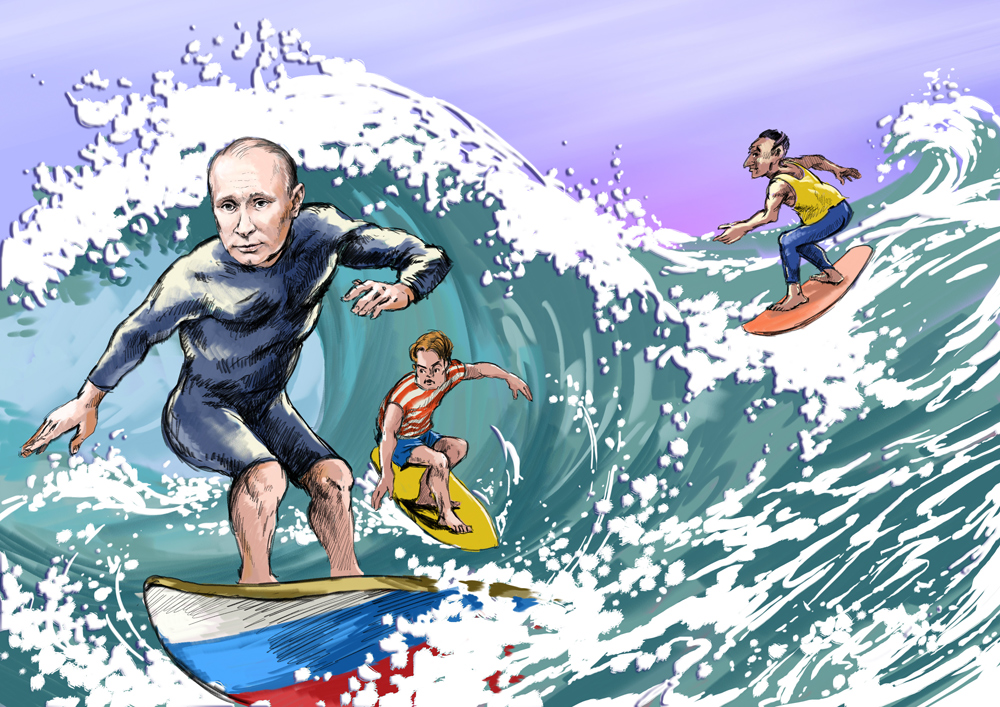

Click to enlarge the image. Drawing by Dmitry Divin
You are probably old enough to remember when, according to the British government, Russia was a pariah state. A time when the Prime Minister, David Cameron, told Vladimir Putin that “his country will be isolated from the world community if the crisis in Ukraine is not resolved.” Of course, you would have been younger then. It was last November.
This week, the same Putin essentially stole the show at the United Nations General Assembly. Meanwhile, Cameron’s presence was barely noticed. Even by the British press. Fleet Street’s finest were far more interested in Jeremy Corbyn’s maiden conference speech as Labour Party leader.
Cameron did pop up on the American CBS TV network, where he said: "I built a relationship with him (Putin)… He’s a very strong Russian nationalist.”
"I built a relationship with him...He’s a very strong Russian nationalist..." @David_Cameron on his relationship with #Putin@CBSThisMorning
— Norah O'Donnell (@NorahODonnell) September 29, 2015Just 10 months after talking tough about his Russian counterpart, Cameron seemed happy just to be able say that he knows him. Oddly, the PM didn’t even stick around to address the Assembly himself, leaving Foreign Secretary Philip Hammond to do the talking.
It’s not only Britain where the tune has changed. Only three months ago, Germany newspaper, Deutsche Wirtschafts Nachrichten, reported that Angela Merkel was determined to keep Russia isolated. Indeed, despite opposition from her predecessors, Gerhard Schroeder and Helmut Schmidt, the Chancellor’s government has remained in lockstep with Washington throughout the Ukraine crisis.
This week, her Vice Chancellor, Sigmar Gabriel, broke ranks and stated: “We will have to change our relationship with Russia. Europe can’t keep up sanctions on Russia forever and at the same time ask Russia for help.”
Of course, Germany is under severe pressure from the current refugee crisis. Or migrant crisis as the mainstream UK media calls it, loathe to concede that Syrians, Iraqis and Libyans are genuine asylum seekers. To do that would be to admit that the ‘regime change’ policy in the region, heartily endorsed by successive British governments, has created a humanitarian disaster.
Western policy in Syria has not yielded the expected results. Throughout, the Kremlin and its Iranian allies have steadfastly clung to Assad as the best man to guarantee stability. Meanwhile, the NATO countries have taken the opposite view, that the Syrian government is the main problem.
While both sides continued their philosophical posturing, IS grew from a small Iraqi terrorist group into a de facto state which controls large swathes of Syria and Iraq. The organization’s aim is to return to the early days of Islam, literally dragging the region back to the Dark Ages. IS have crucified children, flung alleged homosexuals off rooftops and imposed a horrible reign of terror on the territories they control.
At the same time that IS is running amok and a humanitarian crisis has spiralled out of control, the two Christian superpowers, Russia and America, have engaged in proxy war in Ukraine. In fact, neither side showed any great urgency to resolve the Middle East’s nightmare until large numbers of refugees began to appear in Europe.
Sure France, Britain and the US have launched air strikes against IS positions but these have a limited impact. Random aerial bombardment, detached from actual boots on ground, is about as effective as trying to dig a trench with a spoon. Russia's policy of arming the Syrian government has also been a dead end. Assad's forces are simply not strong enough to tackle IS alone.
While NATO powers continue their occasional assaults on IS, Putin has upped the ante. Using an operations centre in Baghdad, Russia, Iran and Iraq have formed the nucleus of an alternative coalition, one that favors the integrity of the Syria state. However, Putin's expressed wish is to work together with the western bloc.
At the UN on Sept. 28, Putin indirectly blamed Washington for the current crisis. The Kremlin has long expressed concern that US hegemony is dangerous for global security. Nevertheless, the President then suggested a broad international consensus, including the US, against terrorism, "similar to the anti-Hitler coalition" of the past. Putin implored Muslim religious leaders to show "guidance" to stop the spread of terrorism associated with the faith.
In reality, Russia was never actually isolated. The Kremlin’s attempts to tackle IS appear to be genuine. With luck, western powers will now work with Russia to defeat this menace.
Bryan MacDonald is an Irish journalist who focuses on Russia and international geopolitics.
All rights reserved by Rossiyskaya Gazeta.
Subscribe
to our newsletter!
Get the week's best stories straight to your inbox